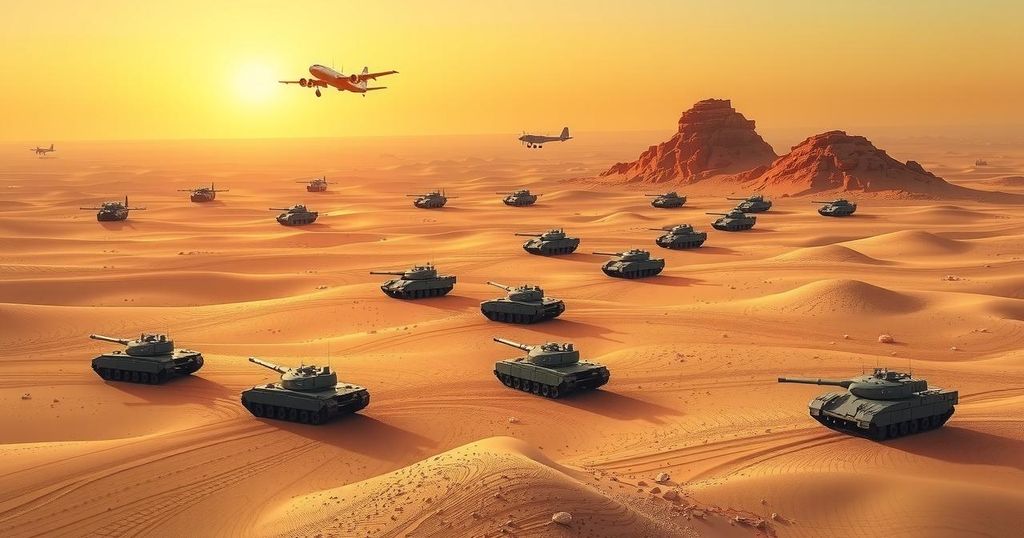Sudan’s Military Capitalizes on Gains Amid Ongoing Civil Conflict

Sudan’s military retakes the presidential palace in Khartoum, marking a critical turning point in the ongoing civil war. Military gains are attributed to external support from Russia, Iran, and other allies. The situation remains dire for civilians, reflecting a severe humanitarian crisis amidst regional powers vying for influence.
Sudan’s military achieved a significant victory by retaking the presidential palace in Khartoum, marking a pivotal point after nearly two years of intense civil war. Video footage circulated showing army troops celebrating inside the damaged structure. This triumph highlights a notable shift in the military’s fortunes following initial defeats against the paramilitary forces led by Gen. Mohamed Hamdan Dagalo, known as Hemedti, who vowed to continue fighting despite heavy losses.
The army’s resurgence is attributed to support from Russia, Iran, and other allies, which provided arms and resources vital for recent gains on the battlefield. Conversely, the RSF has struggled with governance and supply issues, leading to decreased effectiveness and control. The army made an assertive statement of determination to eliminate the militia’s influence, pushing further in their campaign for total victory.
The civil conflict intensified after a long-standing rivalry between the leaders of Sudan’s military factions escalated, causing widespread devastation across the country. Sudan now faces one of the world’s worst humanitarian crises, with millions displaced and casualties estimated to be shockingly high, ranging from 150,000 to 500,000. Numerous regional powers have intervened, seeking to promote their interests in this chaotic struggle for resources and influence.
The UAE is accused of supporting the RSF due to concerns over the military’s proximity to political Islamists and its interest in gold resources controlled by RSF. Conversely, the Sudanese army turned to traditional allies like Russia and Iran after initial calls for Western support were overlooked, leading to strategic realignments.
Russia’s motivations are both strategic and opportunistic, aiming for a naval base on the Red Sea and leveraging the conflict to cement its influence in the region. Moscow shifted its support towards the Sudanese army following previous challenges with the Kremlin’s regional fleet and seeks economic gains from mineral resources like gold.
Military advancements have included acquiring Iranian drones that have been reported as pivotal on the front lines. While technology plays a role, analysts point out that successful mobilization and recruitment efforts have been crucial for the army. Amid efforts to regain territory and control, both forces exhibit increasingly complex tactical maneuvers with severe implications for civilians caught in the combat.
Despite military gains, the chaos and suffering persist. Civilian accounts reveal the dire living conditions in Khartoum, where armed forces randomly recruit individuals and maintain a tense security environment. With continued violence and human rights abuses, the situation remains precarious, and many express fear amid ongoing hostilities and instability.
Sudan’s military victory in retaking the presidential palace marks a critical moment in the ongoing civil war, reflecting significant shifts in military strength attributed to external support. As the conflict has caused widespread humanitarian crises, both sides appear to perpetuate civilian suffering. With foreign powers vying for influence, the situation remains complex and unstable, indicating that while military objectives progress, the humanitarian challenges and risks to civilians continue to escalate.
Original Source: www.telegraph.co.uk







